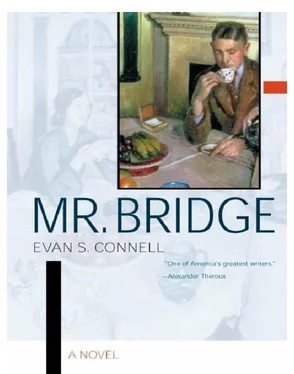As they came within sight of the house Mr. Bridge asked, “Are you glad to be home?”
“It’s better than a police station,” Douglas said. “Old man Knapp sure can run. I never figured an old geezer like that could run as fast. He must be about a hundred.”
“He was chasing you, was he?”
“Why else do you think we ended up in the police station?”
“I’ve been wondering about that. How did he manage to catch all three of you?”
“He never did catch me or Vandermeer. We outran him. But he was gaining on Tipton, so Tipton tried a short cut through McGreevy’s back yard, except he forgot they had a clothesline and just about strangled himself. That’s how Tipton got caught.”
Mr. Bridge parked the Chrysler in the garage and turned off the motor. Then he said, “You and that other boy, did a police car pick you up?”
“No. We got to the end of the block and waited, only when Tipton never showed up we figured old man Knapp had got him, so we went back.”
“That’s how he caught you?”
“No. We saw him hanging on to Tipton’s collar, so we gave ourselves up. Then he had Mrs. McGreevy call the cops.”
“Why did you surrender?”
“Who knows?” Douglas replied with a shrug. “We just decided to.”
After a few moments Mr. Bridge said, “Well, here we are. Let’s go in,” and he opened the car door. Douglas got out the other side, and they began walking toward the house.
“Dad,” Douglas said, “when you were a kid did you ever do anything like this?”
“I imagine I did. I’ve forgotten, it’s been so long. I suppose I did. Yes, I expect I must have done a few things similar to this, although I’m quite certain nobody ever caught me.”
“I could’ve got away without any trouble.”
“I know,” Mr. Bridge said. He found his house key and opened the door and held it for his son to go in. “I have one bit of advice: do a first-rate job on that garbage tomorrow morning.”
“Nobody needs to tell me,” Douglas remarked as he entered the house. “Also, thanks for getting me out of jail.”
“You’re welcome,” said Mr. Bridge.
Sunday noon, about an hour before dinner, Harriet walked into the living room carrying the silver tray on which there was a small glass of sherry for Mrs. Bridge and a whisky sour for Mr. Bridge. After he had tasted the whisky he smacked his lips and wagged a finger at Harriet and told her she did not know what she was missing. She grinned but said nothing. She did not drink. She would not take so much as a glass of wine with her meals. When she was first interviewed she had said she did not drink. He had been skeptical, and for months after she came to work he expected to find some evidence that she had lied; but months went by and then years went by while there was no indication that she ever took a drink. This puzzled him. In her room she kept a Bible which she often read, she attended church every week, and she liked to sing hymns in the kitchen; yet her refusal did not seem to be based on religion. Evidently it was a personal thing: she preferred not to, just this and nothing else. He had taught her to mix a few simple cocktails so he no longer had to go into the kitchen to do it himself, and she did not mind mixing them, but she never tasted them. If he teased her about this she answered simply that she did not care to.
Now he remarked as he had many times before that a drink would do her good. Then Harriet said a daiquiri might be nice, and it was as though a spell had been cast on the room.
After a long silence Mr. Bridge set his whisky sour aside, stood up, and beckoned to her. “Come along,” he said. “I intend to make this one myself.” He led the way to the kitchen followed by Harriet, the children, and finally by Mrs. Bridge; and there they stood around and watched while he mixed Harriet’s daiquiri. When it was ready he placed it in the center of the tray, picked up the tray, clicked his heels, and presented it to her.
She accepted her first drink with immense poise. She sipped it while everybody waited.
“Well?” he asked. “What do you think?”
“This is really very good,” she said.
“Praise the Lord,” he said.
They marched back to the living room and resumed their places. Harriet took a seat at the end of the sofa, holding the daiquiri delicately with her slender fingers.
“So you like that, do you?” he asked.
“Well, yes,” she answered. “I must say I do.”
Harriet’s status began to interest Carolyn, and the fact that her ancestors presumably were slaves brought to America from Africa made her all the more fascinating. One morning when the two of them were in the house alone Carolyn ordered her to sweep the back steps, where several maple leaves had fallen during the night. Harriet refused. Not only did she refuse, she answered that she was going to tell Carolyn’s mother.
Mrs. Bridge learned about the squabble as soon as she got home. Carolyn wanted Harriet fired. Harriet responded by threatening to quit. She had no intention of quitting, she was perfectly satisfied with her position and did not want to lose it, but she felt that under the circumstances her threat was justified. Then, too, she had been thinking about asking for a raise, and her bargaining position might be strengthened if her employers believed she was ready to quit. As to the possibility of being fired, she knew Mr. Bridge well enough to know he would not even consider such a thing.
Mrs. Bridge did not know what to do, so she took the problem to her husband.
He listened. He thought it over. He suspected Harriet was bluffing. Except for Carolyn’s absurd behavior she had no legitimate complaint. She was adequately paid and she knew it. She had a comfortable room of her own next to the kitchen, she had a day off each week and occasionally an extra day off if there was a bona-fide reason. She got a liberal gift at Christmas and a two-week paid vacation every summer. She could, of course, find another job in the neighborhood without much trouble, because she had a good reputation; all the same he thought she was pretending to be more insulted than she actually was. She must have some other reason for threatening to quit. He could not guess what that might be, but for the moment it was irrelevant. The problem, he decided, was not Harriet. The problem was Carolyn.
And the more he considered her foolish command the more it exasperated him because her behavior was a reflection upon himself, as though in some way he had not communicated to her his own sense of personal dignity. He sent for her. He lectured her for quite a while, and at last he concluded: “You will treat Harriet courteously. She is not your property, nor is she mine. President Lincoln once said ‘It is no pleasure to me to triumph over anyone.’ Remember that, Carolyn, as long as you live. And now let us hear no more of this.”
41 Onward, Christian Soldiers
Once a year Dr. Foster came to dinner. He arrived at seven and he departed at ten. He never forgot to bring a little gift — flowers, a box of salted nuts, hard candies, or a bottle of sherry made by the monks in California. One year he brought a copy of a book of essays he had written, which were published by a local house. Mrs. Bridge already had bought and read his book, and she had told him how much she enjoyed it, but evidently he had forgotten; or possibly there was a surplus and he worried that the unsold copies might unceremoniously appear on a department-store bargain table. For whatever reason, there were now two copies of Dr. Foster’s book in the house, both copies autographed. Mr. Bridge had read a few pages. Dr. Foster mentioned Mankind frequently, and almost every page contained some reference to faith or hope. The essays were modestly confessional, confessing to such sins as the desire when he was a boy to run off with a circus; but, as he noted, he had managed to overcome this temptation. Mr. Bridge had not opened the book a second time. There was nothing specifically wrong, except that it was dull. It was remarkably dull. The man seemed to possess an exceptional gift for being dull. Sentence after sentence had been hauled to the surface as though he had cranked them out of a cistern in a bucket. And like most men who are incurably dull he considered himself lively, and was under the impression that everybody talked about him; consequently he was twice as dull in person as he was in the pulpit, or when he commenced an essay: I take pen in hand …
Читать дальше












